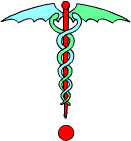The Post Quiz: Medicine and Advertising
Created | Updated Aug 27, 2012
There's nothing new under the sun. Or is there? Try this quiz.
WARNING: The following contains frank (well, sort of) discussions of medical details. Not for the squeamish.
The Post Quiz: Medicine and Advertising

This quiz is multiple choice.
1. In 1885, what was believed (by doctors) to be the most common cause of erectile dysfunction?
a. Playing with yourself.
b. Air pollution.
c. Bad diet.
d. Getting up close and personal with alien races.
2. In 1885, what cure was being offered for erectile dysfunction?
a. A little blue pill.
b. Hypnosis.
c. An injection.
d. A suppository.
3. As a selling point for surgical instruments in 1912, you should mention what place as their point of origin?
a. The USA.
b. Germany.
c. Japan.
d. The UK.
4. What did the products of the Cluthe Rupture Institute have in common with exercise belts advertised in modern infomercials?
a. They were modelled in public by beautiful people.
b. They required you to sign a legal release form.
c. They claimed to use massage to tone muscles.
d. They could be paid for by credit card.
5. What complaint was Lydia Pinkham's Vegetable Compound designed to treat?
a. Headache.
b. Painful periods in women.
c. Erectile dysfunction in men.
d. Constipation.
6. Why do feminists praise Lydia Pinkham?
a. She was a ruthless and successful businesswoman.
b. She advocated free love in her brochures.
c. She shared information on women's health issues.
d. She ran for public office in Massachusetts.
7. When did the first patent medicine appear in the US?
a. In the 1850s.
b. In the 1870s.
c. During the War of 1812.
d. In the 1790s.
8. In the 19th-century US, why did patent medicines have names like 'Indian Root Pills' and ' Nez Perce Catarrh Snuff'?
a. People believed that Native Americans hardly ever got sick.
b. People thought Native American languages sounded exotic.
c. People thought using Native American names was patriotic.
d. People thought Native American medicine was supernatural in origin.
9. What about the UK? How far back do patent medicines go there?
a. Not at all. There have never been any 'patent medicines' in Britain. The Elizabethan NHS wouldn't allow it.
b. Not very far. Patent medicines turned up in the 19th Century in response to US trends.
c. At least to the 18th Century, due in part to German influence.
d. Pretty far. Doctors were making their own medicines in the 17th Century.
10. In the 19th-century US, what element often featured in an old-time infomercial?
a. Music.
b. Flea circuses.
c. Jokes.
d. All of the above.
Think you know the answers? Click on the edifying picture below.

